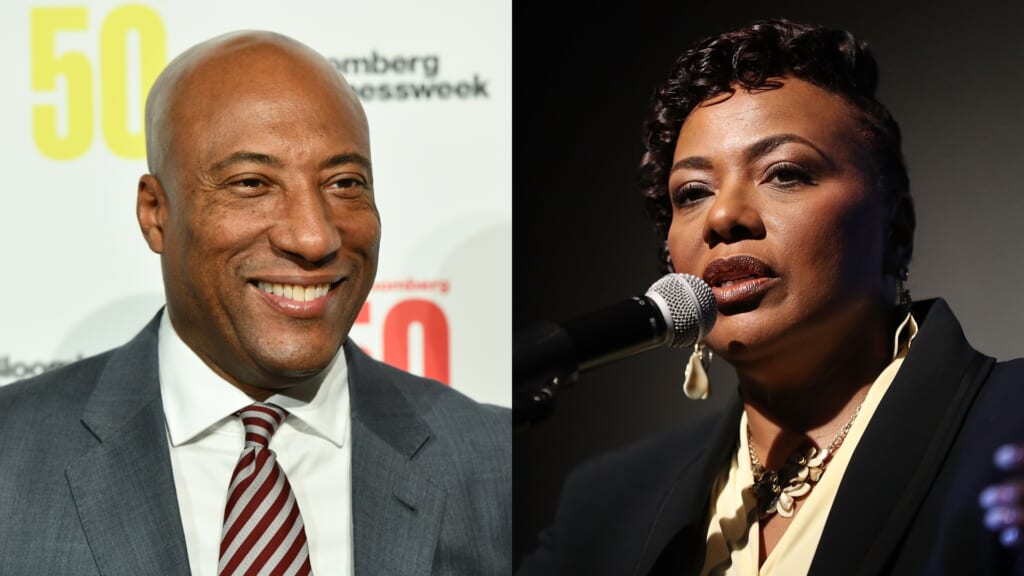Byron Allen moderates King Center panel on voting rights
Allen spoke with several key figures, including Dr. Bernice King, on the importance of the Black vote
On Friday, Aug. 27, Byron Allen, founder and CEO of Allen Media Group, which owns theGrio, moderated a panel on the voting rights of Black Americans. The panel was streamed online via Facebook, Twitter, YouTube, and the King Center’s official website.
Panelists included Rev. Dr. Martin Luther King Jr.’s daughter Dr. Bernice A. King, Congresswoman Nikema Williams, Sherrilyn Ifill, and Michael Li from the Brennan Center for Justice. The panel was titled “Don’t Stop: March For Justice – A Special Conversation Exploring the Impact of March on Washington and Dr. King’s ‘I Have a Dream Speech.'”
King spoke about the continued suppression of the Black vote and why it’s important to continue to advocate for voting rights, particularly for people of color.
“If their vote is disenfranchised and we are marking it hard and difficult to vote, things are similar today but a static difference is we have more Black and brown people registered to vote than ever in the history of our country,” she said.
King said the 2020 Presidential election is proof of the power of the Black vote in spite of constant efforts to suppress it.

“We saw in the last election where people were registered to vote in massive numbers — 95% of Georgians, which includes 35% of Black Georgians, are registered to vote —the biggest irony is the same message is we want to make it easy to vote and hard to cheat…but they are making it hard to vote and easy to cheat. We have to apply much pressure and alternative civil disobedience means,” King said.
She also said it is imperative that everyone remember her father’s message in this fight.
“My father said in 1968 that we have to look at these levels of disruptions when we are dealing with issues so critically important. This is about our democracy. If we can’t vote, we can’t get to economic inclusion, equal education, or environmental justice,” she said.
King continued: “If my father was here, he’d be doing this work. We need activism and people behind the doors to do so. The power of my father’s movement is that they have sustained government. Think about the Montgomery Bus Boycott, with 383 days off the bus. Our backs are against the wall but my mother used to say, ‘Baby, the darkest hour is before dawn.’ The beauty is that daybreak will come if we continue to apply the pressure because the universe is on the side of justice.”
Allen joked that the boycott, which lasted from Dec. 1955 to Dec. 1956, forced Black people to improvise to get around, carpooling and using private vehicles to replace bus service, similar to what Uber and Lyft do today.
“Black people invented ride-sharing,” Allen joked. “We were the first Uber,” King chimed in.
Allen said that people have the power to make change as the government needs our money and our vote.
“We have to get a calculator – know the numbers, and hold the system accountable,” Allen said. “Know your value, know your work. When we show up, we win. When we don’t, we lose. That’s how you know your power because they try to suppress you.”
He continued, “violence is not an option. Intellectual capacity is, we just have to apply ourselves,” reaffirming Dr. King’s non-violent approach. Allen also says it’s important to put our money where our mouths are by investing in politicians and the right causes in order to move forward.
Congresswoman Williams said the fight to uphold John Lewis’ legacy is ongoing as the John Lewis Voting Rights Act to prevent further voter suppression was passed in the House three days ago but faces an uphill battle in the Senate.
“Some things have changed but others have stayed the same – the agenda remain,” she noted.

Furthermore, Williams said we have a chance to step up as our ancestors did in the civil rights movement.
“Voting impacts everything that we care about. If you always wondered what you’d do back then, now is the time to act on it.”
“There are two minds of attack, which include voter restrictive policies such as identification issues and voting by mail. There’s also simply minority discrimination where they draw maps at the polls and try and make the votes of Blacks and Latinos not matter,” said Li.
But Ifill said we can, and should, press forward despite the obstacles facing people of color.
“We are clear on what racism and white supremacy is and when we realize such, we can work against it,” she said. “Look at what’s happening in the South, in Texas, with their recent [voter suppression] laws. Those laws are in response to the power of the Black vote. We aren’t on the run. Let’s continue to leverage the power that we have to push for what we need and protect our full citizenship in this country.”
Have you subscribed to theGrio’s “Dear Culture” podcast? Download our newest episodes now!
TheGrio is now on Apple TV, Amazon Fire and Roku. Download theGrio.com today!
